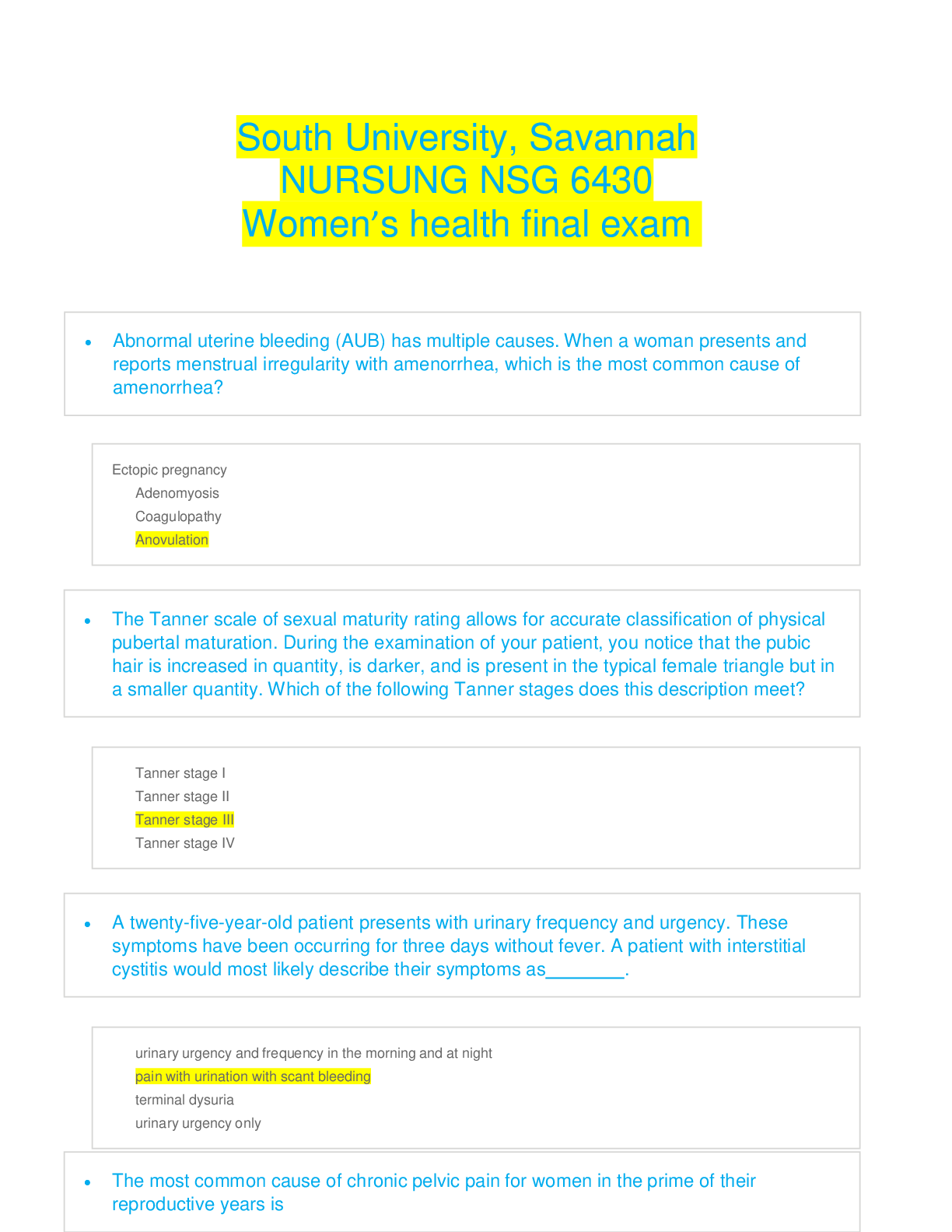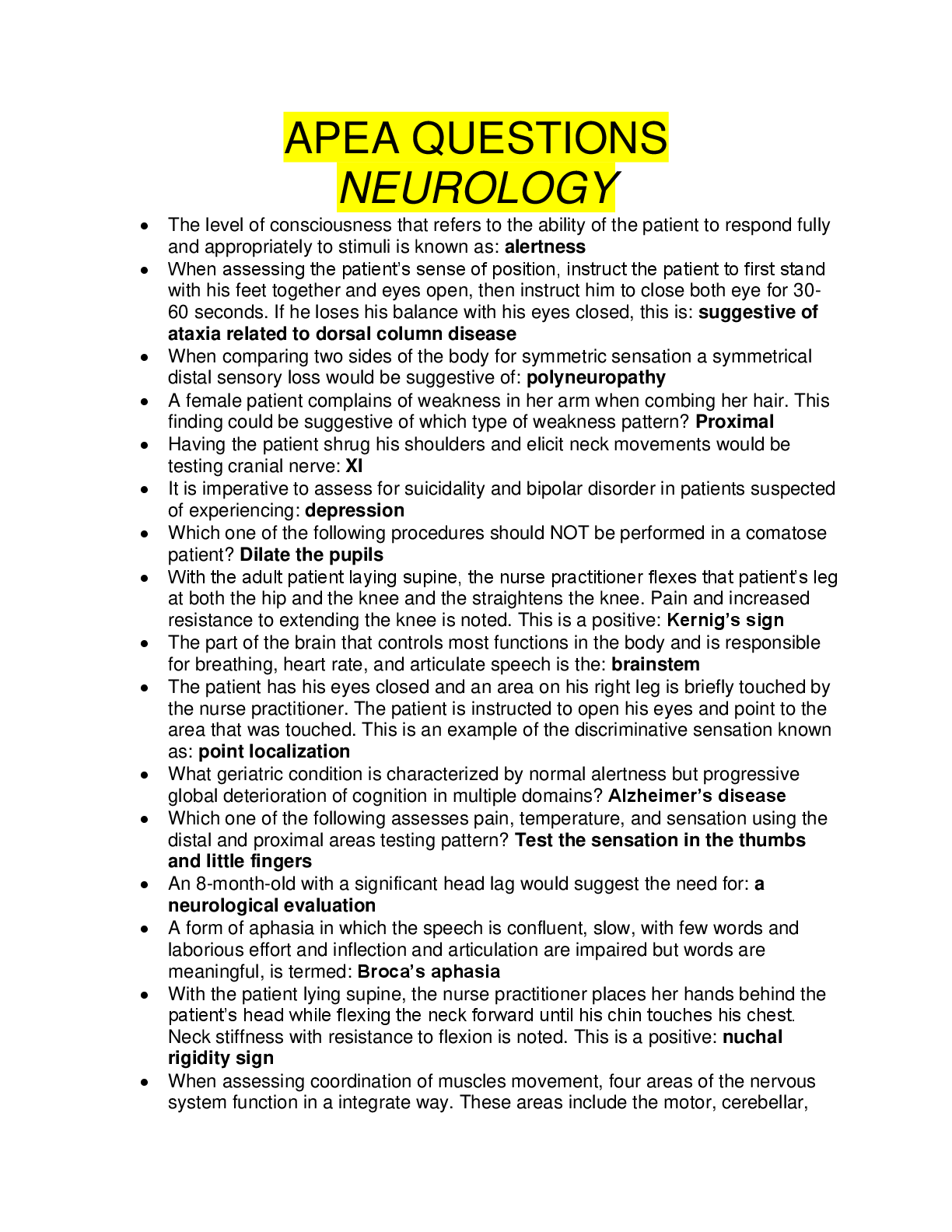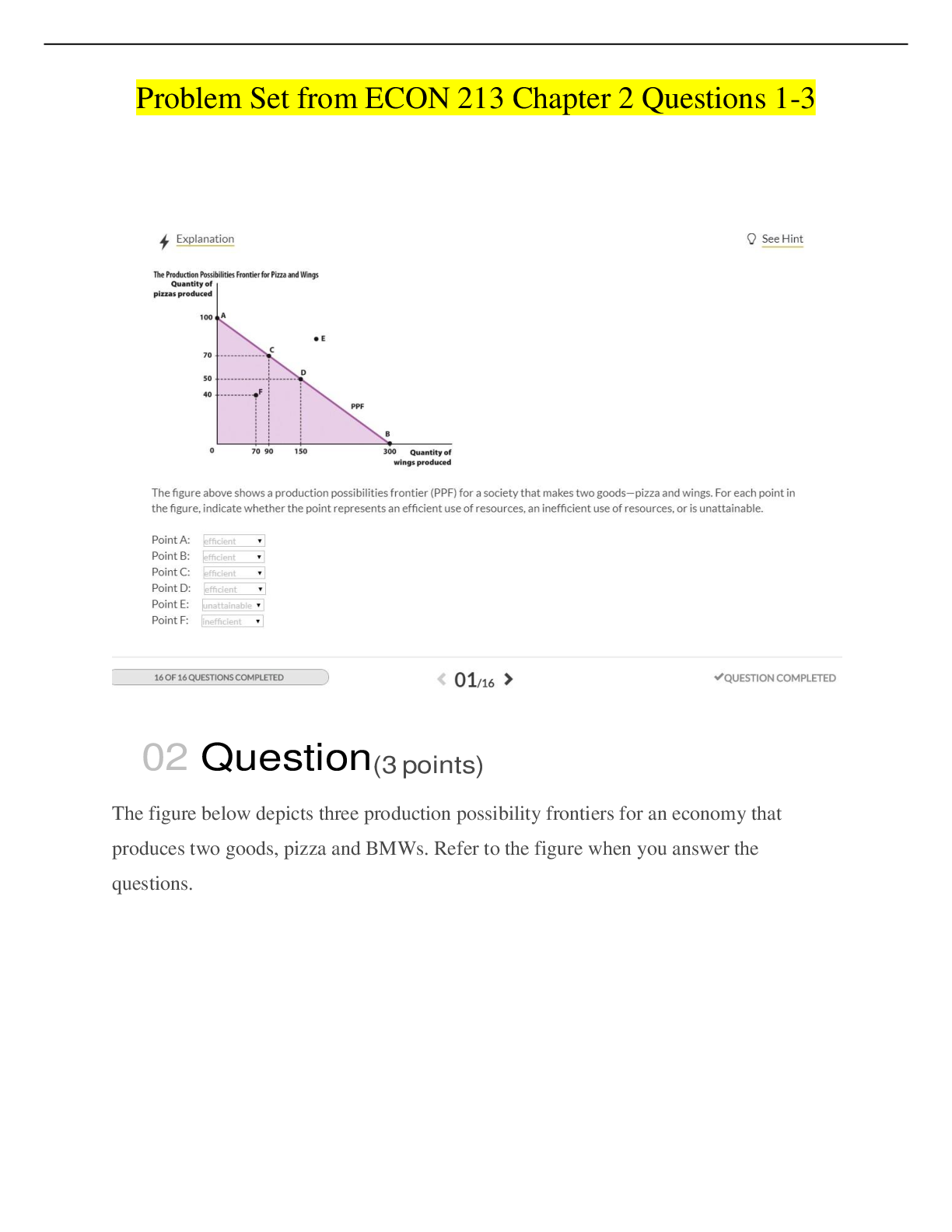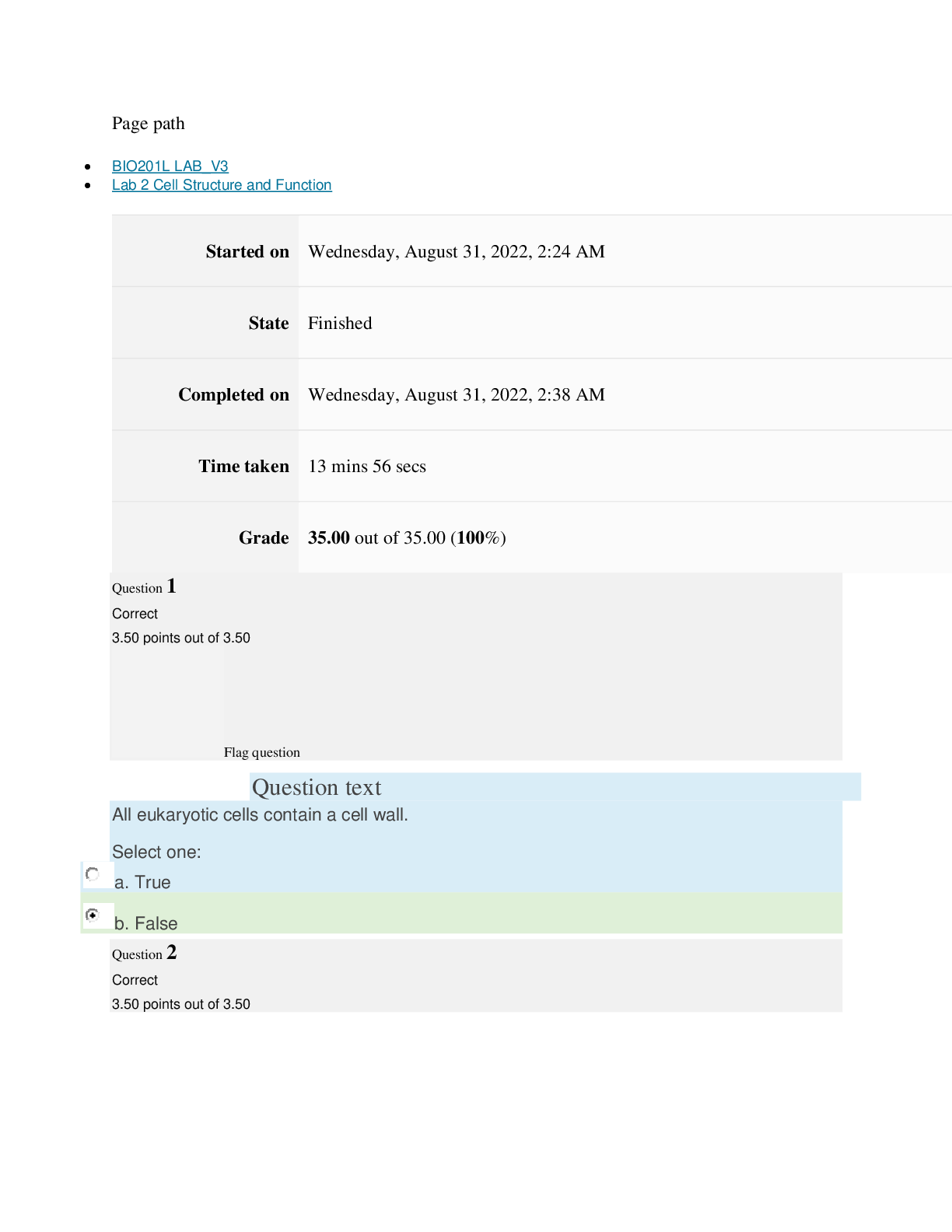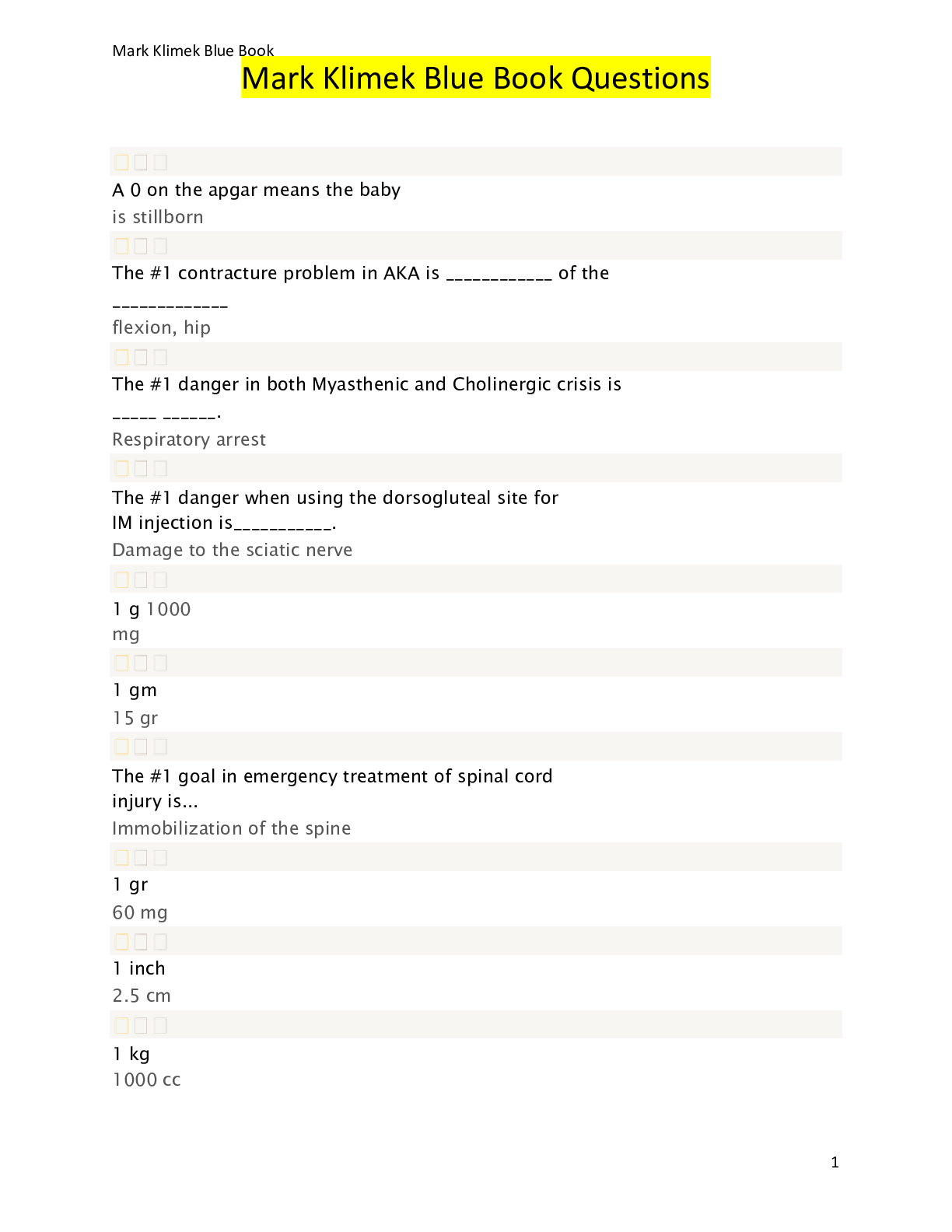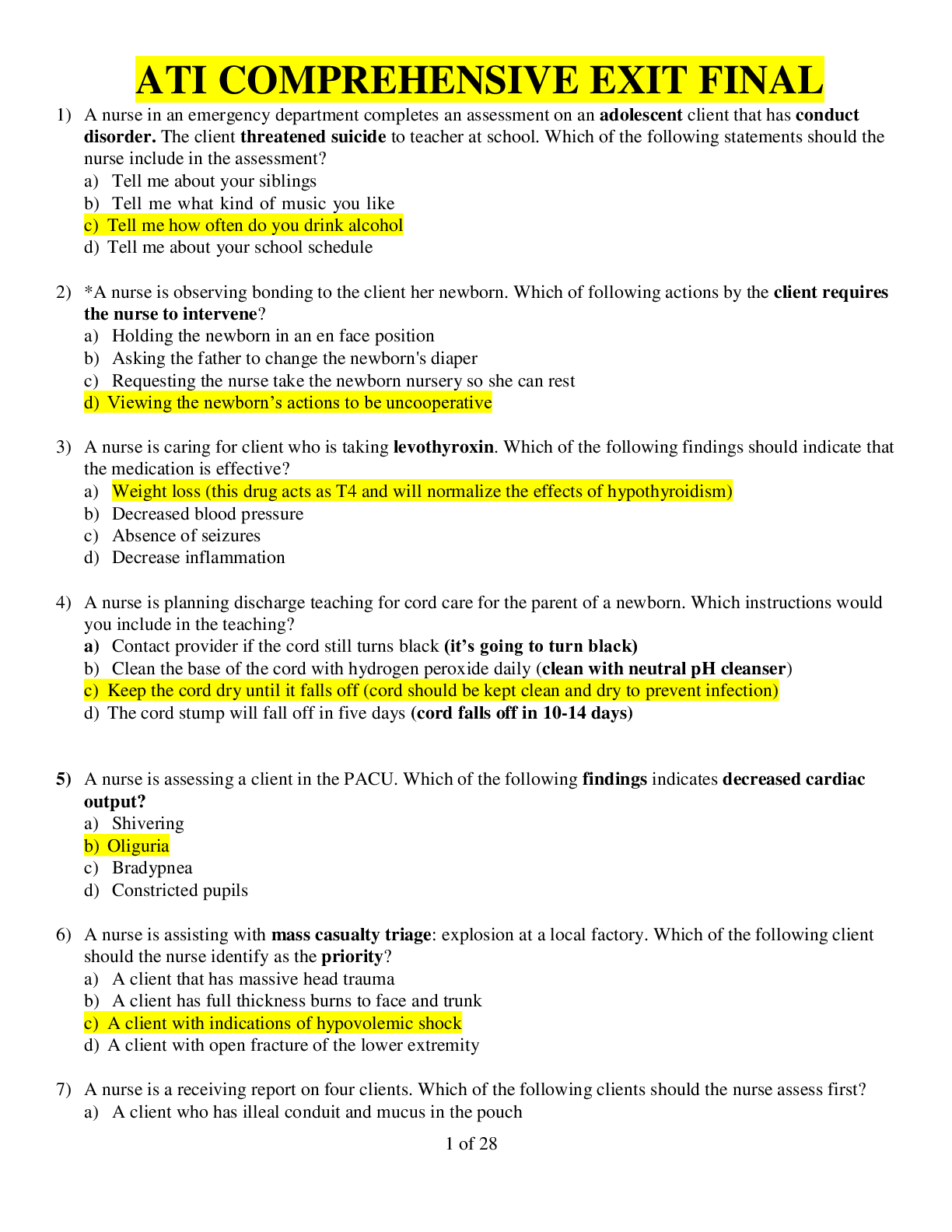*NURSING > QUESTIONS & ANSWERS > Walden University > NURSING GR 6512 > NURSING GR 6512 NURSING GR 6512 100 Question Advance Health As (All)
Walden University > NURSING GR 6512 > NURSING GR 6512 NURSING GR 6512 100 Question Advance Health Assessment
Document Content and Description Below
NURSING GR 6512 100 Question Advance Health Assessment • Question 1 1 out of 1 points Mr. Franklin is speaking with you, the health care provider, about his respiratory problem. Mr. Frankli... n says, "I've had this cough for 3 days, and it's getting worse." You reply, "Tell me more about your cough." Mr. Franklin states, "I wish I could tell you more. That's why I'm here. You tell me what's wrong!" Which caregiver response would be most appropriate for enhancing communication? • Question 2 1 out of 1 points Spasmodic muscular contractions of the head, face, or neck are called: • Question 3 1 out of 1 points Sweat glands, hair, and nails are all formed from: • Question 4 1 out of 1 points Regardless of the origin, discharge is described by noting: • Question 5 1 out of 1 points The examiner's evaluation of a patient's mental status belongs in the: • Question 6 1 out of 1 points Cherry angiomas are a common finding in: • Question 7 0 out of 1 points Recommended carbohydrate content of total dietary intake (% total calories) is ____%. • Question 8 1 out of 1 points Which is the best way to position a patient's neck for palpation of the thyroid? • Question 9 0 out of 1 points Periods of silence during the interview can serve important purposes, such as: • Question 10 1 out of 1 points What finding is unique to the documentation of a physical examination of an infant? Selected Answer: Fontanel sizes • Question 11 1 out of 1 points Expected normal percussion tones include: • Question 12 1 out of 1 points Which cranial nerves innervate the face? • Question 13 1 out of 1 points In counseling a client regarding nutrition education, you explain that linoleic acid, a major fatty acid, is thought to be essential for: • Question 14 1 out of 1 points Subjective and symptomatic data are: • Question 15 1 out of 1 points Which statement is true regarding the relationship of physical characteristics and culture? • Question 16 1 out of 1 points The position on a clock, topographic notations, and anatomic landmarks: • Question 17 1 out of 1 points During an interview, you have the impression that a patient may be considering suicide. Which action is essential? • Question 18 1 out of 1 points Which of the following organs is part of the alimentary tract? • Question 19 0 out of 1 points Mr. Black is a 44-year-old patient who presents to the clinic with complaints of neck pain that he thinks is from his job involving computer data entry. As the examiner, you are checking the range of motion in his neck and note the greatest degree of cervical mobility is at: • Question 20 1 out of 1 points When you are questioning a patient regarding alcohol intake, she tells you that she is only a social drinker. Which initial response is appropriate? • Question 21 1 out of 1 points As you explain your patient's condition to her husband, you notice that he is leaning toward you and pointedly blinking his eyes. Knowing that he is from England, your most appropriate response to this behavior is to: • Question 22 1 out of 1 points Peritonitis produces bowel sounds that are: • Question 23 1 out of 1 points When recording physical findings, which data are recorded first for all systems? • Question 24 1 out of 1 points Pigmented, raised, warty lesions over the face and trunk should be assessed by an experienced practitioner who can distinguish: • Question 25 1 out of 1 points Tangential lighting is best used for inspecting skin: • Question 26 1 out of 1 points Mrs. Leonard brings her newborn infant into the pediatrician's office for a first well-baby visit. As the health care provider, you teach her that newborns are more vulnerable to hypothermia due to: • Question 27 1 out of 1 points Which technique is most likely to result in the patient's understanding of questions? • Question 28 1 out of 1 points A guideline for history taking is for caregivers to: • Question 29 1 out of 1 points The review of systems is a component of the: • Question 30 1 out of 1 points After thorough inspection of the abdomen, the next assessment step is: • Question 31 1 out of 1 points Mrs. Britton brings her 16-year-old son in with a complaint that he is not developing correctly into adolescence. Which structures disproportionately enlarge in the male during adolescence? • Question 32 1 out of 1 points Mrs. Webb is a 38-year-old patient who has been changing her lifestyle to eat in a healthy way and lose weight. During your health promotion education regarding her nutritional status, you explain the function of dietary protein as: • Question 33 1 out of 1 points Nasal symptoms that imply an allergic response include: • Question 34 1 out of 1 points A blood pressure cuff bladder should be long enough to: • Question 35 1 out of 1 points Which of the following is an "ABCD" characteristic of malignant melanoma? • Question 36 1 out of 1 points Which part of the information contained in the patient's record may be used in court? • Question 37 1 out of 1 points Brittle nails are typical findings in: • Question 38 1 out of 1 points You are completing a general physical examination on Mr. Rock, a 39-year-old man with complaints of constipation. When examining a patient with tense abdominal musculature, a helpful technique is to have the patient: • Question 39 1 out of 1 points Mrs. Tuber is a 36-year-old patient who comes into the health center with complaints that her fingernails are not growing. Which structure is the site of new nail growth? • Question 40 1 out of 1 points Mr. Sanchez is a 45-year-old gentleman who has presented to the office for a physical examination to establish a new primary care health care provider. Which of the following describes a physical, not a cultural, differentiator? • Question 41 1 out of 1 points Mr. Abdul is a 40-year-old Middle Eastern man who presents to the office for a first visit with the complaint of new abdominal pain. You are concerned about violating a cultural prohibition when you prepare to do his rectal examination. The best tactic would be to: • Question 42 0 out of 1 points A 5-year-old child presents with nasal congestion and a headache. To assess for sinus tenderness you should palpate over the: • Question 43 1 out of 1 points Unusual white areas on the skin may be due to: • Question 44 1 out of 1 points Tympanic thermometers measure body temperature when a probe is placed: • Question 45 1 out of 1 points When assessing abdominal pain in a college-age woman, one must include: • Question 46 1 out of 1 points Tracheal tug suggests the presence of a(n): • Question 47 0 out of 1 points The recommended minimum daily protein requirement for the normal adult is ______. • Question 48 1 out of 1 points Mr. Williams, age 25, has recovered recently from an upper and lower respiratory infection. He describes a long-standing nasal dripping. He is seeking treatment for a mild hearing loss that has not gone away. Information concerning his chronic postnasal drip should be documented within which section of his history? • Question 49 1 out of 1 points You are palpating a patient's thyroid and find that its broadest dimension measures 4 cm. The right lobe is 25% larger than the left. These data would indicate: • Question 50 1 out of 1 points During an interview, tears appear in the patient's eyes and his voice becomes shaky. Initially, you should: • Question 51 1 out of 1 points When communicating with older children and teenagers, you should be sensitive to their: • Question 52 1 out of 1 points Inspection of the abdomen should begin with the patient supine and the examiner: • Question 53 1 out of 1 points The infant should be placed in which position to have his or her height or length measured? • Question 54 1 out of 1 points A college student comes to the student health center complaining of difficulty in concentrating during class and while studying. The diet that would contribute to this problem is one that consumes mostly: • Question 55 1 out of 1 points Small, minute bruises are called: • Question 56 1 out of 1 points White, rounded, or oval ulcerations surrounded by a red halo and found on the oral mucosa are: • Question 57 1 out of 1 points Under normal circumstances, how much water is lost daily by the body? • Question 58 0 out of 1 points Knowledge of the culture or cultures represented by the patient should be used to: • Question 59 1 out of 1 points A tool used to screen adolescents for alcoholism is the: • Question 60 1 out of 1 points Your patient is complaining of acute, intense sharp epigastric pain that radiates to the back and left scapula with nausea and vomiting. Based on this history, your prioritized physical examination should be to: • Question 61 1 out of 1 points Which technique is most likely to result in the patient's understanding of questions? • Question 62 1 out of 1 points Which of the following formats would be used for visits that address problems not yet identified in the problem-oriented medical record (POMR)? • Question 63 1 out of 1 points Mrs. Hartzell is a 34-year-old patient who has presented for nutritional counseling because she is a vegetarian. Deficiency of which of the following is a concern in the vegetarian diet? • Question 64 1 out of 1 points Underestimation of blood pressure will occur if the blood pressure cuff's width covers: • Question 65 1 out of 1 points Mrs. Raymonds is a 24-year-old patient who has presented for a routine concern over her current weight. In your patient teaching with her, you explain the importance of macronutrients. Which of the following is a macronutrient? • Question 66 1 out of 1 points The most common form of birth trauma of the scalp is: • Question 67 1 out of 1 points A detailed description of the symptoms related to the chief complaint is presented in the: • Question 68 0 out of 1 points Penicillin is considered a • Question 69 0 out of 1 points Your patient presents with symptoms that lead you to suspect acute appendicitis. Which assessment finding is least likely to be associated with this condition early in its course? • Question 70 1 out of 1 points Auscultation should be carried out last, except when examining the: • Question 71 1 out of 1 points Mr. D. complains of a headache. During the history, he mentions his use of alcohol and illicit drugs. This information would most likely belong in the: • Question 72 1 out of 1 points Which of the following is the most vital nutrient? • Question 73 1 out of 1 points A brief statement of the reason the patient is seeking health care is called the: • Question 74 1 out of 1 points During physical examination of a 30-year-old Chinese man, you notice slight asymmetry of his face. The cranial nerve examination is normal. Your best action is to: • Question 75 1 out of 1 points Tuning forks with a frequency of 500 to 1000 Hz are most commonly used to measure: • Question 76 1 out of 1 points Ms. Davis is a 27-year-old patient with a BMI of 33. Based on her BMI, your diagnosis would be: • Question 77 1 out of 1 points When hearing is evaluated, which cranial nerve is being tested? • Question 78 1 out of 1 points Ms. G. is being seen for her routine physical examination. She is a college graduate and president of a research firm. Although her exact salary is unknown, she has adequate health insurance. Most of the above information is part of Ms. G.'s _____ history. • Question 79 1 out of 1 points To correctly document absent bowel sounds, one must listen continuously for: • Question 80 1 out of 1 points Mr. Johnson presents with a freely movable cystic mass in the midline of the high neck region at the base of the tongue. This is most likely a: • Question 81 1 out of 1 points George Michaels, a 22-year-old patient, tells the nurse that he is here today to "check his allergies." He has been having "green nasal discharge" for the last 72 hours. How would the nurse document his reason for seeking care? • Question 82 1 out of 1 points When palpating the abdomen, you should note whether the liver is enlarged in the: • Question 83 1 out of 1 points Your patient is complaining of acute, intense sharp epigastric pain that radiates to the back and left scapula with nausea and vomiting. Based on this history, your prioritized physical examination should be to: • Question 84 1 out of 1 points Mr. Akins is a 78-year-old patient who presents to the clinic with complaints of hearing loss. Which of the following are changes in hearing that occur in the elderly? Select all that apply. • Question 85 1 out of 1 points When are open-ended questions generally most useful? • Question 86 1 out of 1 points Which of the following is an expected change in the assessment of the thyroid during pregnancy? • Question 87 1 out of 1 points When assessing abdominal pain in a college-age woman, one must include: • Question 88 1 out of 1 points Which of the following occurs when firm pressure is used to apply the stethoscope's bell end-piece to the skin? • Question 89 1 out of 1 points In issues surrounding ethical decision making, beneficence refers to the: • Question 90 1 out of 1 points Before performing an abdominal examination, the examiner should: • Question 91 1 out of 1 points Mr. Donalds is a 45-year-old roofer. Your inspection to determine color variations of the skin is best conducted: • Question 92 1 out of 1 points During percussion, a dull tone is expected to be heard over: • Question 93 1 out of 1 points Your patient returns for a blood pressure check 2 weeks after a visit during which you performed a complete history and physical. This visit would be documented by creating a(n): • Question 94 1 out of 1 points As part of your health promotion education for a new patient, you explain that the risk factors for skin cancer include: • Question 95 1 out of 1 points Mrs. Kinder is a 39-year-old patient who presents to the office with complaints of an earache. In explaining to the patient about the function of her ears, which ear structure would you tell her is responsible for equalizing atmospheric pressure when swallowing, sneezing, or yawning? • Question 96 1 out of 1 points Mrs. Britton is a 34-year-old patient who presents to the office with complaints of skin rashes. You have noted a 4' 3-cm, rough, elevated area of psoriasis. This is an example of a: • Question 97 1 out of 1 points Mr. Kevin Marks is a new health care provider. What is the best method to develop cultural competence? • Question 98 1 out of 1 points Coarse, dry, and brittle hair is associated with which metabolic disorder? • Question 99 1 out of 1 points Mr. and Mrs. Johnson have presented to the office with their infant son with complaints of ear drainage. When examining an infant's middle ear, the nurse should use one hand to stabilize the otoscope against the head while using the other hand to: • Question 100 1 out of 1 points You have just completed a skin assessment on Mr. Baker. During your assessment, you have transilluminated a skin lesion. During the physical examination, you know that skin lesions are transilluminated to distinguish: Friday, October 4, 2019 9:37:22 PM EDT [Show More]
Last updated: 2 years ago
Preview 1 out of 17 pages
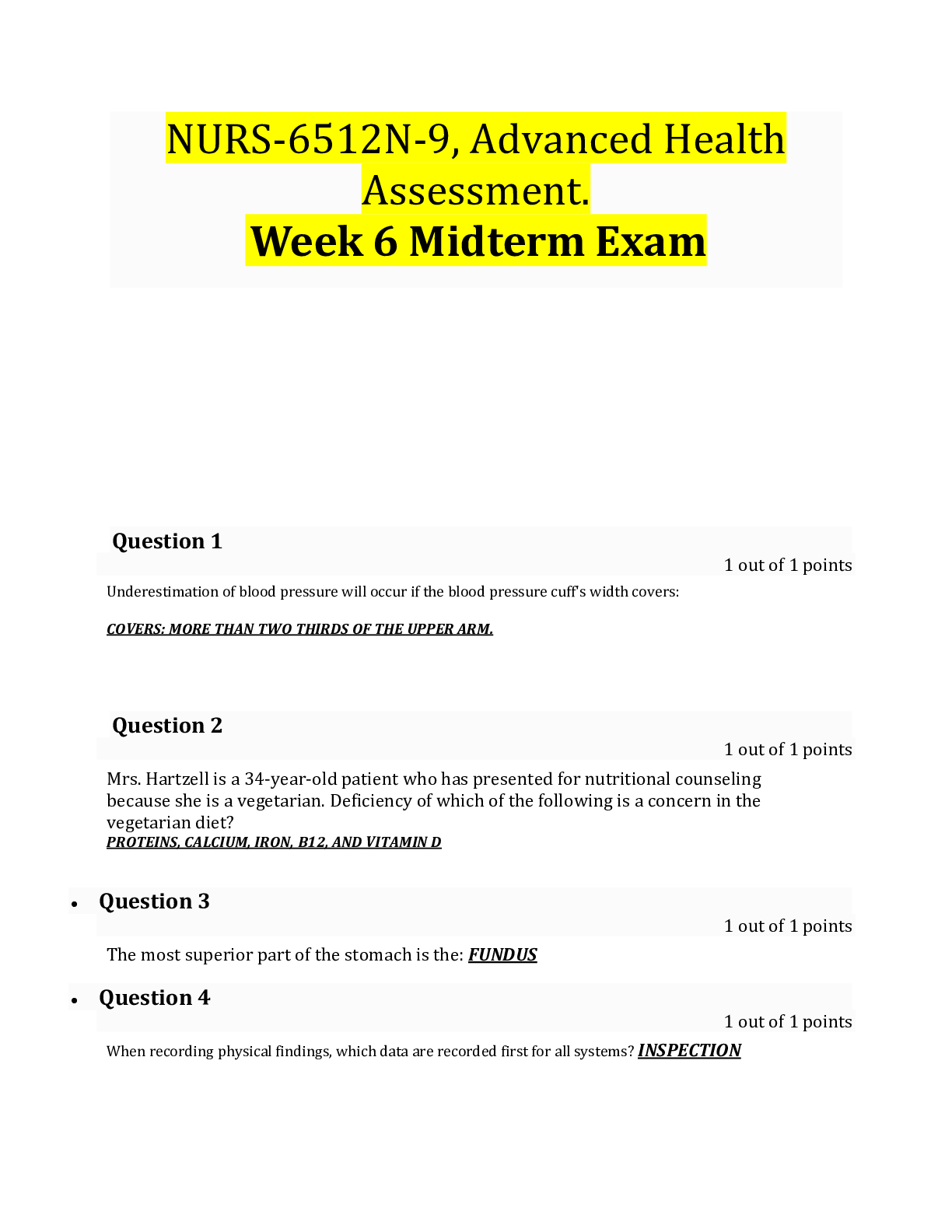
Buy this document to get the full access instantly
Instant Download Access after purchase
Buy NowInstant download
We Accept:

Reviews( 0 )
$15.00
Can't find what you want? Try our AI powered Search
Document information
Connected school, study & course
About the document
Uploaded On
Apr 13, 2020
Number of pages
17
Written in
Additional information
This document has been written for:
Uploaded
Apr 13, 2020
Downloads
0
Views
73

